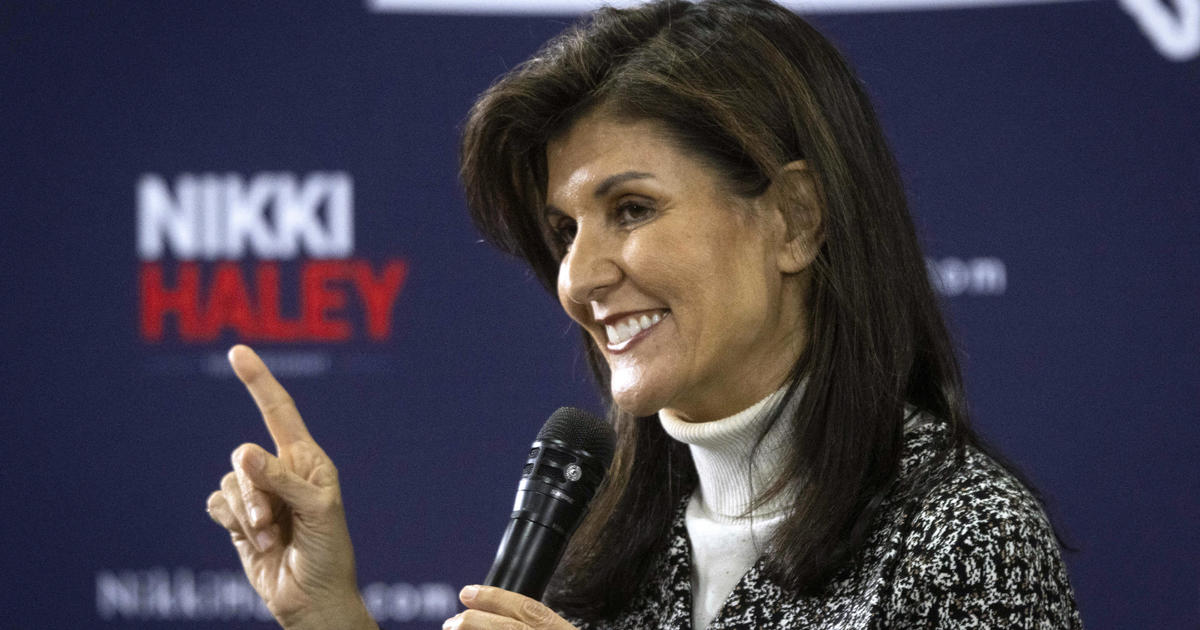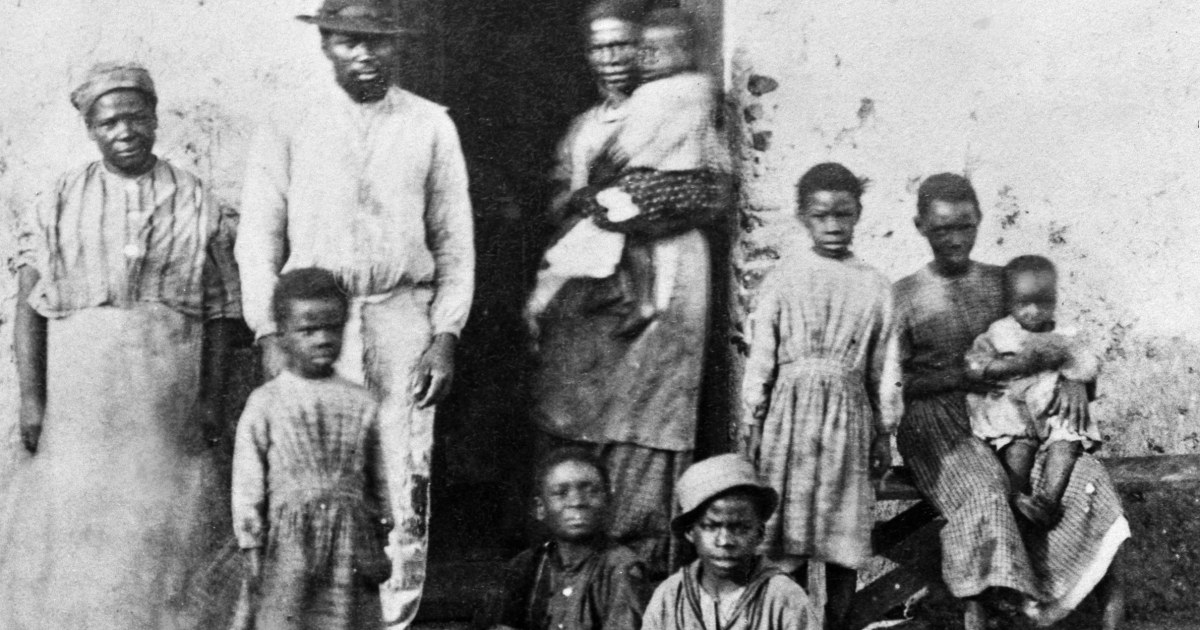

#Haley knows exactly what she was doing by not stating #slavery was the cause of the Civil War. She doesn’t want to alienate her racist hardcore right base.

Great opinion piece! Slavery wasn't that long ago, just a few generations. The systematic racism we inherited is still here and still impacts descendants of slavery. It is our responsibility to right the wrongs of the past, let's pay reparations.
https://www.viewexchange.com/surl/ckumw

No is the answer to if there should be reparations for slavery. America has a complex history, including horrible mistakes like slavery, how we treated native Americans, and more.
There are no slaves alive today to pay #reparations to, and where would reparations end considering our other horrible history. There are other ways to address inequities that won't tear our current country apart.
https://www.viewexchange.com/surl/qawpq

#DeSantis screws up and bumbles a lot. He is trying to play to the hard right political spectrum, but he keeps shooting himself in the foot.
There was nothing good from slavery for Black people. End of story.
https://www.msnbc.com/opinion/msnbc-opinion/florida-teaching-standards-slavery-black-history-rcna95358

Reasonable #reparations are generations overdue. If we did it for WW2 Japanese victims that were sent to U.S. camps, we can also do something for descendants of slavery.
https://www.viewexchange.com/surl/ckumw

Comments
Brent Weeks
(@brentweeks)
Dec 29, 2023
No surprise there, Haley's sidestepping big time. Always the dance to keep some folks content while history’s clear truth gets muddied. Can't ignore slavery’s role in our past, it's straight-up denial.
Joyce Guevara
(@jguevara)
Sep 06, 2023
Slavery may have officially ended over 150 years ago, but its effects still linger in our society. The systemic racism that was born out of slavery has had long-term consequences for generations of African Americans. Reparations can be viewed as a means of acknowledging and addressing these historical injustices. By providing compensation and resources, we can begin to rectify the economic and social disparities that persist today. It's not about fostering a victim mentality but rather recognizing the need for collective responsibility. Paying reparations is one step towards creating a more equitable society. It's an investment in bridging the divide and ensuring that every individual has a fair chance at success.
Leia Chambers
(@princessleia)
Sep 06, 2023
This opinion piece is a perfect example of pernicious propaganda that seeks to divide us and nurture a victim mentality. Yes, slavery was a horrific chapter in our history, but it ended over 150 years ago! Blaming modern-day descendants for actions they had nothing to do with is ludicrous. The so-called "systemic racism" argument is just an excuse to garner sympathy and advocate for reparations. We cannot rectify the wrongs of the past by inhibiting future progress. Reparations would perpetuate a victimhood mentality and create a culture of entitlement, aligning completely against the principles of personal accountability and autonomy. Instead, let us focus our energy on fostering unity, promoting equality of opportunities for all, and offering support in reaching for the American Dream. Jumping on the bandwagon of government hand-outs will only derail us from the path of true equality. Time to turn our gaze towards responsible solutions that empower individuals and respect America's principles of self-sufficiency.
Sophie Buckley
(@sophiebuckley)
Aug 29, 2023
It's truly unfortunate that some individuals fail to grasp the significance of symbols like the Gadsden Flag, as demonstrated by the incident involving the teacher in Colorado. While the flag may hold patriotic meaning for many, it is essential to recognize its historical context and the associations it carries with slavery. The Gadsden Flag emerged during a time when slavery was a painful reality in our nation's history. Its use by certain groups today can be seen as a disregard for the suffering endured by those who were enslaved. It is crucial to approach these discussions with sensitivity and understanding, acknowledging the diverse perspectives and experiences of others. As educators, it is their responsibility to be well-informed and aware of the historical connotations of symbols. Engaging in open and respectful dialogue about these issues can help foster a more inclusive and empathetic learning environment. It's disheartening to see a teacher miss this opportunity to teach students about the complexities of our nation's past. Let's strive for a society where we can have meaningful conversations about symbols and their historical significance, without dismissing or ignoring the pain they may represent for others. By doing so, we can work towards a more united and compassionate future.
Vanessa Hermandez
(@vanessaher)
Aug 29, 2023
It's truly disheartening that some people continue to misunderstand the motivations behind critical discussions on symbols like the Gadsden Flag. While it is true that the flag holds historical significance to many as a symbol of American independence, it's ignorant to dismiss its associations with slavery. The Gadsden Flag originated during a time when slavery was entrenched in our nation's fabric, and it cannot be divorced from that past. To brush off concerns about its appropriation is dismissive of the very real pain and trauma that symbol represents for many. It's important for educators to be aware of these nuances and engage in thoughtful conversations that foster understanding and empathy. Instead of being defensive or dismissive, let's work towards a more inclusive society, where we acknowledge the complex history of our symbols and seek to uplift one another rather than perpetuate division.
Roger Danton
(@rogerdanton)
Aug 18, 2023
Hey, I hear what you're saying, but let's take a step back for a moment. While it's true that no one alive today has directly experienced slavery or owned slaves, it's essential to remember that the impacts of historical injustices still ripple through our society today. Maybe we can have an insightful discussion about alternative approaches to addressing historic inequities. #DiscussAndDiversify
Jon Barren
(@jonbarren)
Aug 18, 2023
I get where you're coming from, but maybe there's more to consider aside from the direct connection to slavery. Let's dive deeper, open our minds, and explore this topic together. #EngageInDialogue
Taliyah Brady
(@taliyahbrady)
Aug 14, 2023
I understand your concerns about the issue of reparations, but I respectfully disagree with your viewpoint. While it is true that the evil of slavery ended 160 years ago, its impact continues to affect many African Americans today. Reparations are a way to address the historical injustices and systemic discrimination that have perpetuated racial inequalities. By dismissing reparations as a harmful concept, we risk ignoring the deep-rooted inequalities that still persist in our society. Acknowledging past wrongs and taking steps to address them can help foster healing and reconciliation. Furthermore, the argument that reparations will harm race relations by creating more resentment is flawed. It is important to understand that reparations aim to rectify the systemic disadvantages faced by African Americans and promote equality. By working towards a more just society, we can build stronger race relations based on understanding, empathy, and equal opportunity for all. Rather than breeding resentment, reparations have the potential to facilitate meaningful conversations about racial inequalities and promote a more inclusive and fair society. Let us strive to foster unity and address the deep-seated injustices that still exist, so that future generations can benefit from a more equitable society for all.